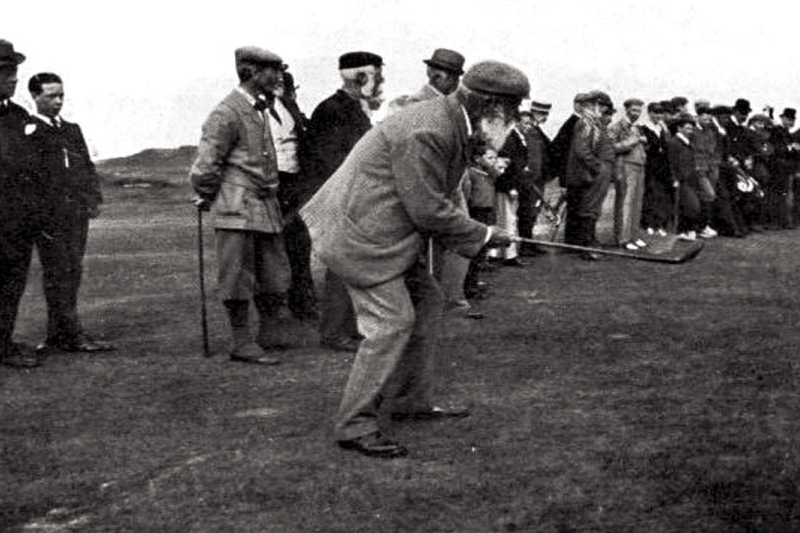There are many golfing legends, both men and women, who have contributed to the game since its invention by the Scots. But there is one who stands above all the greats and his name was "Old" Tom. Old Tom was destined for greatness just by being born in St. Andrews, Scotland, the home of golf and the St. Andrews links. He was the son of a weaver and by age ten (1831) was hitting corks with nails in them around the streets of St. Andrews with a homemade club.
By age fourteen he was a caddie on the links, but he got his first real job in golf as an apprentice to Allan Robertson who managed the links course and also had an equipment and golf ball-making business. Tom spent four years as his apprentice and five more years as a journeyman, all while playing golf and learning the business side of golf, both of which would influence the game for the next fifty years.
The Rest of the Story: Thomas Mitchell Morris, Sr., (1821-1908) better known as "old" Tom, because he had a son (who was also a championship golfer) who friends called "young" Tom, became a genius at golf innovation.
His contributions to golf during the mid to late 1800s included new club design and better golf balls, which helped improve the game, as well as actually designing and laying out new courses. In 1851, he became the keeper of the greens, at the Prestwick Golf Club and soon was the spearhead for enlarging the golf course to eighteen holes and promoting tournaments for professional golfers. By 1860, he helped organize and host the first British Open.
But few people know that by being fired from his apprenticeship with Robertson, his destiny to golf immortality actually took root. The story goes that Robertson taught everything he knew about the golf business to Morris and the pair became close friends and playing partners in numerous golf matches. Playing in alternate shot format over a seven-year period, they never lost a match and soon earned the name "the invincibles." One day, Robertson saw Morris playing a round of golf using a new "guttie" ball (rubber core) and fired "his employee" on the spot. The reason was simple, Robertson made, promoted and sold "featherie balls" (leather ball stuffed with feathers) and saw Morris as a traitor to his business. Morris, who saw this as an opportunity, became a competitor to Robertson in 1849 and never looked back!
In 1864, Morris was invited to become a paid (50 pounds per year) greenskeeper at the St. Andrews Golf Course. Morris stayed at this post for the next forty years and during that time, redesigned St. Andrews and helped formalize golf to the game we play today. One of his first chores was to widen the fairways to speed up play, manicure the hazards to meet playable standards, install yardage markers, top dress greens, use push mowers to cut the greens, establish different tee boxes for play and most significantly, shorten the course from twenty-two holes to eighteen.
Old Tom was a great businessman when it came to promoting and selling the game of golf. But not many golf fans know that he was also a championship golfer. He helped to organize and host the first British Open in 1860, and many golfers from his time say he had a method to his madness. In the first British Open he finished second to his rival Willie Park, Sr., but went on to beat Park for the Open Championship title in 1861, 1862 and again in 1867. In the first 12 British Open Championship tournaments, Morris won four times, finished second three times and was in the top six finishes five times. (Not a bad idea for a businessman to promote and win his home tournament while selling clubs, guttie balls and giving lessons ... take that Jordan Spieth.)
When Morris died at age 86 in 1908, it was a national day of mourning in Scotland. Mourners flooded the streets of St. Andrews as if a king had died. He had revolutionized the game of golf and made his mark on the game forever.
19th Hole Trivia:
The eighteenth hole of the Old Course at St. Andrews is named after him.
He was inducted into the World Golf Hall of Fame in 1976.
Old Tom played in the first 36 British Open tournaments.
His son Young Tom also won four British Open titles.




















































